The Last Signs of a Life in Germany Sold at Auction 75 Years Ago
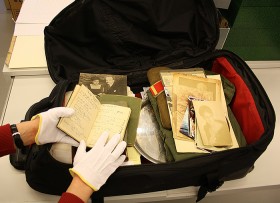
Franziska Bogdanov, unpacking the suitcase from Arno Roland’s bequest
Jewish Museum Berlin CC-BY Katharina Erbe
The items in our archives have arrived here through the most various means: we have donations from German-Jewish emigrants from all over the world as well as gifts from their estates, donated to the museum after they have died by their children. We also receive some gifts from Germany, occasionally from people who aren’t themselves Jewish and yet some memorabilia from a Jewish friend or acquaintance was passed down through the generations in their family.
At the end of this last year we received a donation from the estate of a one-time Berliner who recently died in New Jersey (USA). It consisted of a large suitcase filled to the brim with documents, letters, photographs, and other objects. Materials that someone close to the deceased packed together after his death, thus saving them from imminent destruction. The suitcase contained the legacy of Arno Roland and his family.
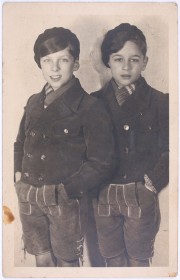
Brothers Arno (1923–2015) and Ulli Rosenfeld (1924–1942), about 1936 © Jewish Museum Berlin, a gift in memory of Ulli Rosenfeld
Through an initial contact made over ten years ago, we already had some information about Arno Roland, formerly Rosenfeld. We knew that he fled Berlin with his brother Ulli at the beginning of 1939 on a Kindertransport to the Netherlands, and that the brothers went underground after the German occupation there. Further, we were aware that Ulli Rosenfeld was caught in 1942 and deported to Auschwitz, while Arno Rosenfeld survived in hiding. Their mother had taken her own life in 1938. Their father was able to emigrate to the USA. This was the extent of the history originally transmitted to us.
When I unpacked the suitcase from Arno Roland and went through it piece by piece, a number of things stood out: a suicide letter from his mother before her death and the brothers’ letters from the Netherlands, full of distress and anxious hope for a better future. A whole stack of photographs going back to the 1920s, meanwhile, gave me a picture of happier days in the life of the Rosenfeld family: a time where the father, Erich Rosenfeld, still owned his thriving wooden moldings factory and nothing seemed to stand in the way of the children’s future.
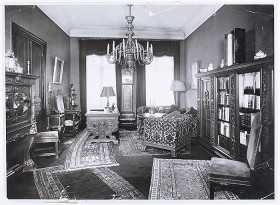
The Rosenfeld family’s study on Helmstedter Strasse 31, Berlin 1941 © Jewish Museum Berlin, a gift in memory of Ulli Rosenfeld
In among these completely personal family photographs, I suddenly came across obviously professionally shot pictures of the Rosenfeld’s Berlin apartment on Helmstedter Strasse 31 in the neighborhood of Wilmersdorf. The rooms looked large and attractive, sumptuously decorated with antiques and paintings. On the back of one photograph was a hand-written note, “Our lovely study.” I had to ask myself why these images were made. The rooms appear gorgeous but uninhabited, and one can hardly imagine how full of life they once were.
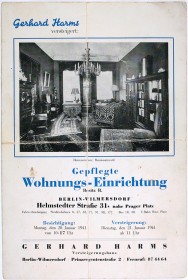
Advertisement from the Gerhard Harms Auction House for the sale of the Rosenfeld family’s home furnishings, Berlin 1941 © Jewish Museum Berlin, a gift in memory of Ulli Rosenfeld
As I examined the materials further, I stumbled on an advertisement from a Berlin auction house with a reproduction of exactly this picture of the family’s study. A caption underneath it specified the date for an auction: 21 January 1941. And on the back side of the notice was a list of the home furnishings on offer with the explicit addition, “non-Aryan property.” The photographs must have been produced for the auction, and Erich Rosenfeld, up to this time, must in all likelihood have still lived in Berlin.
Animated by this extraordinary trove, I researched further. I discovered next that the Gerhard Harms Auction House specialized in auctioning off Jewish property. Such auctions were often undertaken before emigrating and in great haste. They therefore yielded only meager proceeds. Erich Rosenfeld would have had to use the entire return on the sale to pay the so-called Reich Flight Tax and Jewish Property Levy when he left Germany in May of 1941.
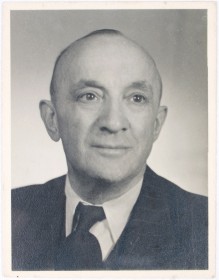
Passport photo of Erich Rosenfeld (born 1881), about 1935–1940 © Jewish Museum Berlin, a gift in memory of Ulli Rosenfeld
From passenger lists, it emerges that he sailed from Lisbon to the USA in 1943. What happened in the two years between 1941 and 1943? It turns out that he had married again after the emigration of both of his sons, so he did not remain behind in Berlin alone. From a letter in this new inventory it became clear that Erich Rosenfeld and his new wife spent two years in Portugal until they at last succeeded in fleeing Europe.
The auction house’s apparently harmless notice touting the “smart furnishings” from the “Property R.” is the last remaining sign of life of the Rosenfeld family in Germany. Their presence in Berlin “came under the hammer” exactly 75 years ago today and with one blow was extinguished. May this anniversary serve to keep their memory alive.
Franziska Bogdanov, archives, plans to develop a finding aid from the Arno Roland inventory in order to make this history available to the public.
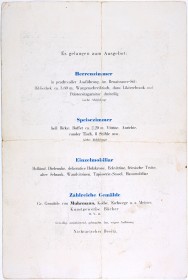
Arno and my father were first cousins. He and I had lost contact so I was doing a search. That’s how I found this.
I’d be interested in any information- when did he die, etc.
Renee Riggs